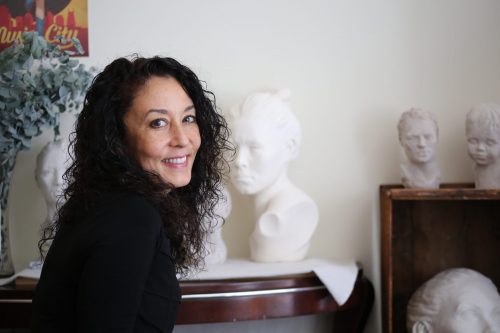Rachida Benamar is a career and life coach, based in London, and the founder of Rama Publishing, a bespoke stationary line. Just like her website Benamar is filled to the brim with pragmatic advice about CV’s, cover letters, presentation and interviewing skills, all in line with her coaching philosophy: find your ‘thing’ and figure out the practical steps to get there. To help clients transition seamlessly from one career to the next, she accesses her intuition to help them see what skills they should leverage and how to create goals so they can actually get there. By asking her clients questions like ‘what would you do if you couldn’t fail,’ and encouraging them to be truthful when formulating their answers they discover how to have a more fulfilling career.
Can you tell me a bit about your background?
I came to London for the first time in 2006. I was done with France, where I grew up, and wanted to travel. Originally I thought I’d only be there for a few months until I called my mom one day and said, “I’m never coming back.” (Laughs)
I had never worked before, and also didn’t speak a word of English, however I found a job in a coffee shop where I was fired after a week because I was so shy. I turned tomato red any time someone talked to me, which is funny because I’m so outgoing now. Next, I met a restaurateur on Oxford Street who hired me even though he could tell by looking at my hands that I’d never worked in hospitality. “I’ll teach you if you’re willing,” he said. From there, I worked as a barista, cocktail waitress, and receptionist. Finally, I applied for a law degree. As a law student, I started tutoring my classmates and dabbling in coaching. After graduation, I worked for a family law firm, which wasn’t for me. I was depressed and didn’t like what I was doing. Shortly after I met my husband and we moved to Melbourne, Australia, for his job. While I was waiting for my visa, I trained as a coach and started my stationary business Rama Publishing. I never looked back and think often about the people who helped me get to where I am.
What made you want to become a career coach?
People say, “I’m not my job” but if you spend 8-10 hours a day doing something then you start to become that thing. I love helping clients who are in the middle of a career transition and terrified of making the next move. While they might feel that they need to start from scratch, or worry they wasted time in a job they didn’t like, they just need help transferring skills.
How do you get your clients to ‘see things they can’t see themselves,’ which was a great testimonial about your work?
From a young age I realized that I was very intuitive. After speaking with a client recently I said to her, “I think you would be great at writing because you are so sensitive.” She almost started to cry and confessed that she had written two novels and never told anyone. My clients appreciate that I listen to them, read their emotions, and direct them to the right path.
Do you find that most people don’t really understand themselves?
Yes, or they understand their desires perfectly and are scared of success. It is frightening to put yourself out there, which is why people self-sabotage. I’ve had clients who knew exactly what made them feel most alive but, they repressed it out of fear or social pressure. Maybe their parents or spouse had a certain idea of what they should be doing, which made them think that their dreams were crazy. Deep down inside, everyone knows what they want to be doing.
Are people are more comfortable seeing a coach than say, a psychotherapist?
Yes. However, while I love that people open up to me I’m not a therapist. My boundaries are clear and I’m not afraid to tell clients that they need counseling. I am there to give my clients a push if they are ready to go after what they want in their career. After coaching people who’ve had a lot of trauma, I’ve realized that it’s imperative they deal with that first. I generally have two types of people that come to me: those who think that seeing a coach is more socially acceptable than a therapist and others who are ready to move on from their current situation. The second one is where I can help.
You place a lot of emphasis on goal setting. Why is so important?
If you don’t have goals, you are surviving versus living. Even small goals, like going for a walk 20-minutes a day, keep you motivated. Goals should be written down and have a specific timeline. When I was at university, I had too many goals, and didn’t know how to accomplish any of them. I started to research how to accomplish goals and the number-one piece of advice was to make a list of what you wanted to achieve and break it down into concrete steps. There is nothing that can build your confidence like doing what you said you were going to do. I believe in having three goals at once.
I would imagine that in order to accomplish goals you have to be good at time-management. Do you have any recommendations for this?
If I can’t do something because I don’t have the time I say “no!” Otherwise you open your diary and it’s packed with things that you think you have to do and you don’t. Next, you resent them. Life is too short to live that way. Once you have your goals then it becomes easier to say “no.” Sometimes people will take a meeting when it could have just been an email. (Laughs)
Success, in my eyes, is doing what you like and liking how you do it, which leads to contentment. People pleasers have a hard time doing this. How can you feel happy if you’re spending all of your time making others happy?
How has being honest helped you in your career?
I felt a cultural shock when I came to the UK, especially in the office world, because everyone was so polite and had the “Of course, I’ll do that for you” mentality. While I had trouble at the beginning, I turned out to be the favorite because I would say, “I don’t have time to do this” otherwise I won’t be able to do the important tasks. If you feel something isn’t the right fit, whether it’s a love interest or a job, they will know because most likely you’ll be complaining about it. However, if you’re true to yourself about what you want, you might hurt someone’s ego but most likely you’ll earn respect. People connect with authenticity not political correctness.
Do you think being connected to self helps people align with the right career?
Yes. Oftentimes there is a disparity between how people see themselves and the reality of who they are. When you know yourself and your values, this gap lessons and the greater chance you have of finding a fulfilling job. I have no qualms with correcting my clients and asking, “If you hate public speaking then why become a barrister?” When you study law the first question is, “How passionate are you about it?” They know if you aren’t obsessed, then you’ll give up. When someone pursues a certain path and hates it you often find out later that their mom and dad did it too.
On the contrary, what happens if you don’t know your values?
It keeps you stuck in a life you don’t like. When you pursue what you are meant to be doing, you are aligned and the right opportunities come in.
How has your job changed you for the better?
Let’s start the gossip. (Laughs) In my first career as a lawyer, I was emotionally erratic, grumpy, and didn’t have great relationships because of my behavior. When you’re unhappy you want to knock others down to your level. Finally, I realized I was bitter and becoming someone I actually was not. When I started to do what I loved my energy skyrocketed. If you feel that you are not adding value to your job or doing it with integrity then you’ll feel miserable. The money doesn’t feel as good if you aren’t ethical.
Can you tell me a bit about your stationary business, Rama Publishing?
I’ve always been obsessed with diaries, notebooks, and stationary. I would get so excited opening a new page because it felt like I was entering a brand new day. I launched this business with a single notebook. Little by little, was my philosophy. While some people might release 100 products a year I release one that I’m proud of because I don’t want to add to the clutter.
Great advice! Do you have any last words of wisdom for us?
Don’t worry so much. Yet, to find out what you want to do with your life you must be curious, read, and ask questions. By doing all of this you’ll fall in love with something. I stumbled across my career by accident. I also don’t believe in one path but rather hundreds. It’s dangerous to believe in one.
Learn more about Rachida Benamar’s coaching services here



